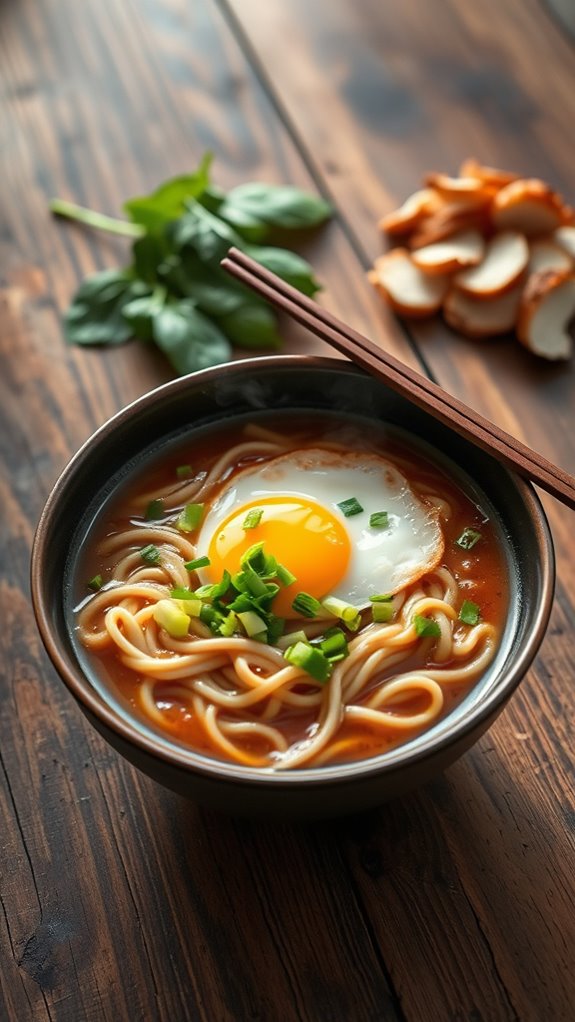Imagine cracking a delicate egg over a steaming bowl of ramen, releasing a wave of flavor that transforms the ordinary into the extraordinary. You might wonder how this simple addition not only enhances the broth but also elevates the entire dish. From creamy soft-boiled perfection to robust hard-boiled variations, the possibilities are endless. What other secrets could be hiding in the world of ramen that await your exploration?
History
When you think about ramen, it's hard not to appreciate its rich history that stretches back over a century. Originating in China, this dish made its way to Japan in the late 19th century, where it began its cultural significance within Japanese cuisine.
You'll notice how ramen has adapted over time, reflecting the culinary evolution sparked by changing tastes and regional influences. From humble beginnings as a street food to its current status in gourmet restaurants, each bowl tells a story.
The interaction between tradition and innovation creates a vibrant tapestry of flavors and textures. Whether you savor a classic shoyu or a modern fusion, you're partaking in a historical journey, celebrating the uniqueness of this beloved dish.
Recipe
Ramen noodles are a comforting staple that can be elevated with the simple addition of an egg. This dish merges the savory flavors of a rich broth with the creaminess of a perfectly cooked egg, resulting in a satisfying meal that can be prepared in under 30 minutes.
Whether you're looking for a quick dinner or a late-night snack, this egg in ramen noodles recipe is both easy to make and delicious.
To make your ramen even more enjoyable, consider adding vegetables, meats, or spices that suit your palate. Ingredients like green onions, spinach, or even slices of cooked chicken can enhance the dish and provide a well-rounded meal.
Follow the straightforward steps below to create a warm bowl of ramen with an egg that you'll love.
Ingredients:
- 1 package of ramen noodles
- 2 cups of water
- 1 egg
- Soy sauce (to taste)
- Green onions (sliced, for garnish)
- Optional: vegetables (like spinach or bok choy) and protein (like chicken or tofu)
Cooking Instructions:
In a medium saucepan, bring 2 cups of water to a boil, then add the ramen noodles, cooking them according to the package instructions until they're tender, usually about 3-4 minutes.
In the final minute of cooking, crack the egg directly into the pot, stirring gently to create ribbons of egg throughout the noodles.
Once done, remove from heat, stir in soy sauce to taste, and ladle the ramen into bowls. Garnish with sliced green onions and any additional protein or vegetables you desire.
Extra Tips:
For a creamier texture, you can slow-cook the egg in the broth instead of stirring it in. To do this, simply crack the egg into the pot without stirring and cover for a minute or two until the egg white is set but the yolk remains runny.
If you'd like an extra kick of flavor, consider adding chili oil or sriracha to your ramen for a spicy twist.
Ultimately, feel free to customize the toppings based on your personal preferences, making this dish as unique as you are!
Nutritional Guide
Understanding the nutritional value of your egg in ramen noodles dish can enhance not just your cooking experience but also your overall health.
The addition of an egg amps up the protein content greatly, providing essential amino acids your body craves. With each bite, you're not only enjoying a comforting meal but also reaping health benefits like increased muscle repair and better satiety.
Eggs also offer valuable nutrients such as vitamins D and B12, which support your immune system and energy levels.
Pairing your ramen with an egg transforms this simple dish into a powerhouse of nutrition, making it a satisfying choice for any time of day.
Final Thought
As you savor that delicious bowl of ramen, remember that the humble egg can elevate your meal to new heights.
Whether you prefer a soft-boiled egg with a runny yolk or a hard-boiled variety for added texture, mastering these cooking techniques can transform your dish. The egg acts as a creamy counterpoint to the savory broth, enhancing the overall flavor combinations while adding a protein boost.
You can experiment by marinating the egg in soy sauce or miso, infusing it with extra umami. The beauty of ramen lies in its versatility; don't hesitate to mix and match ingredients and toppings.

